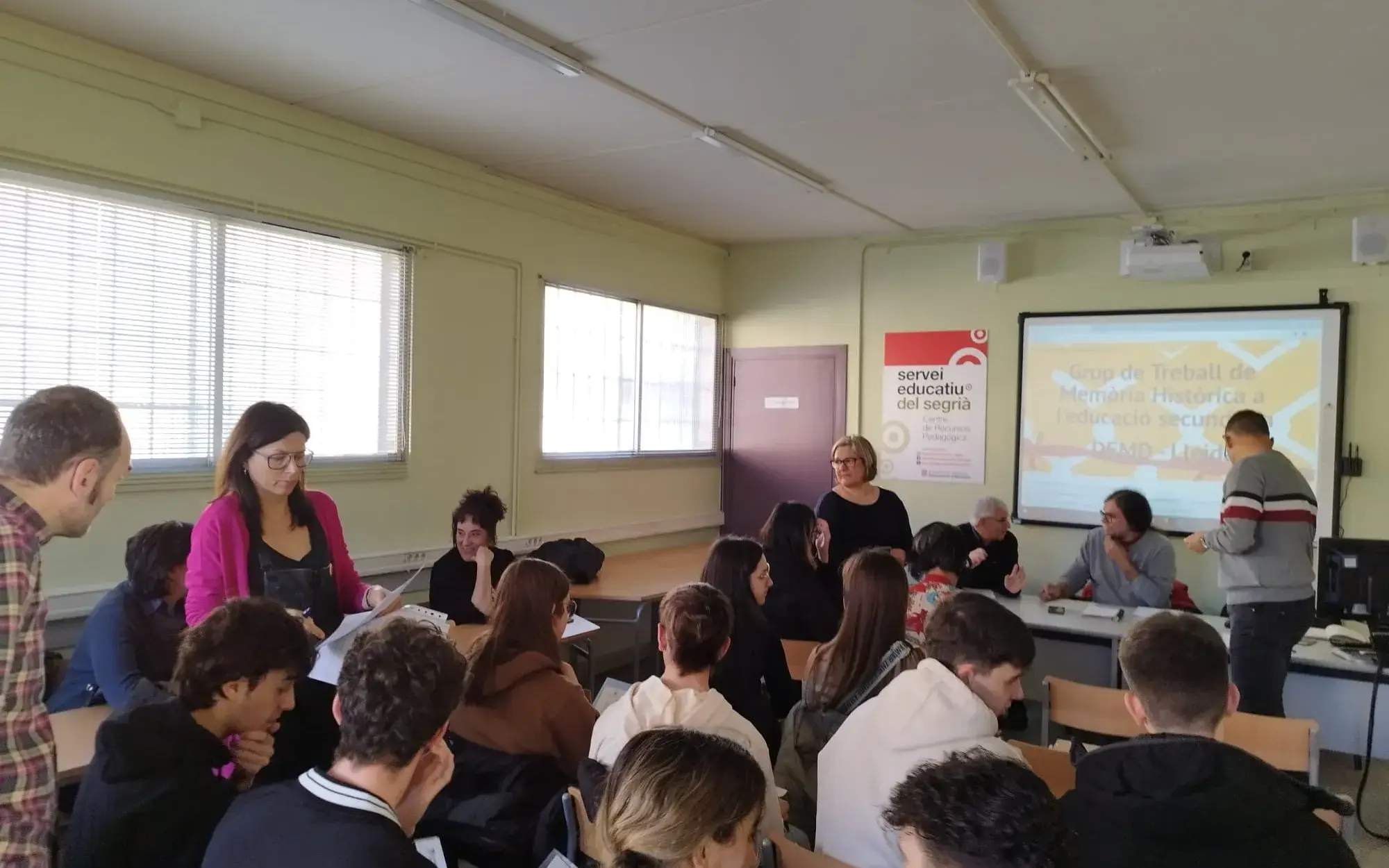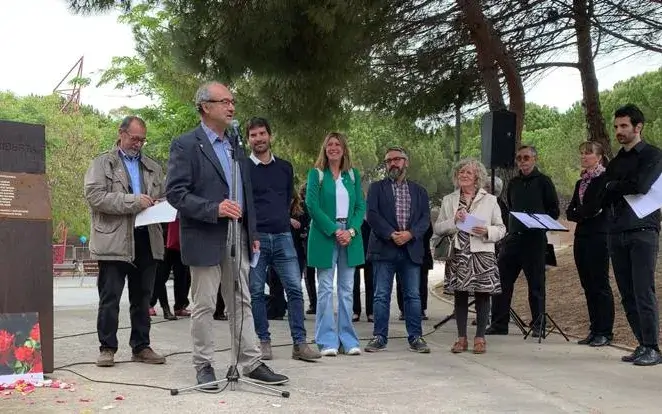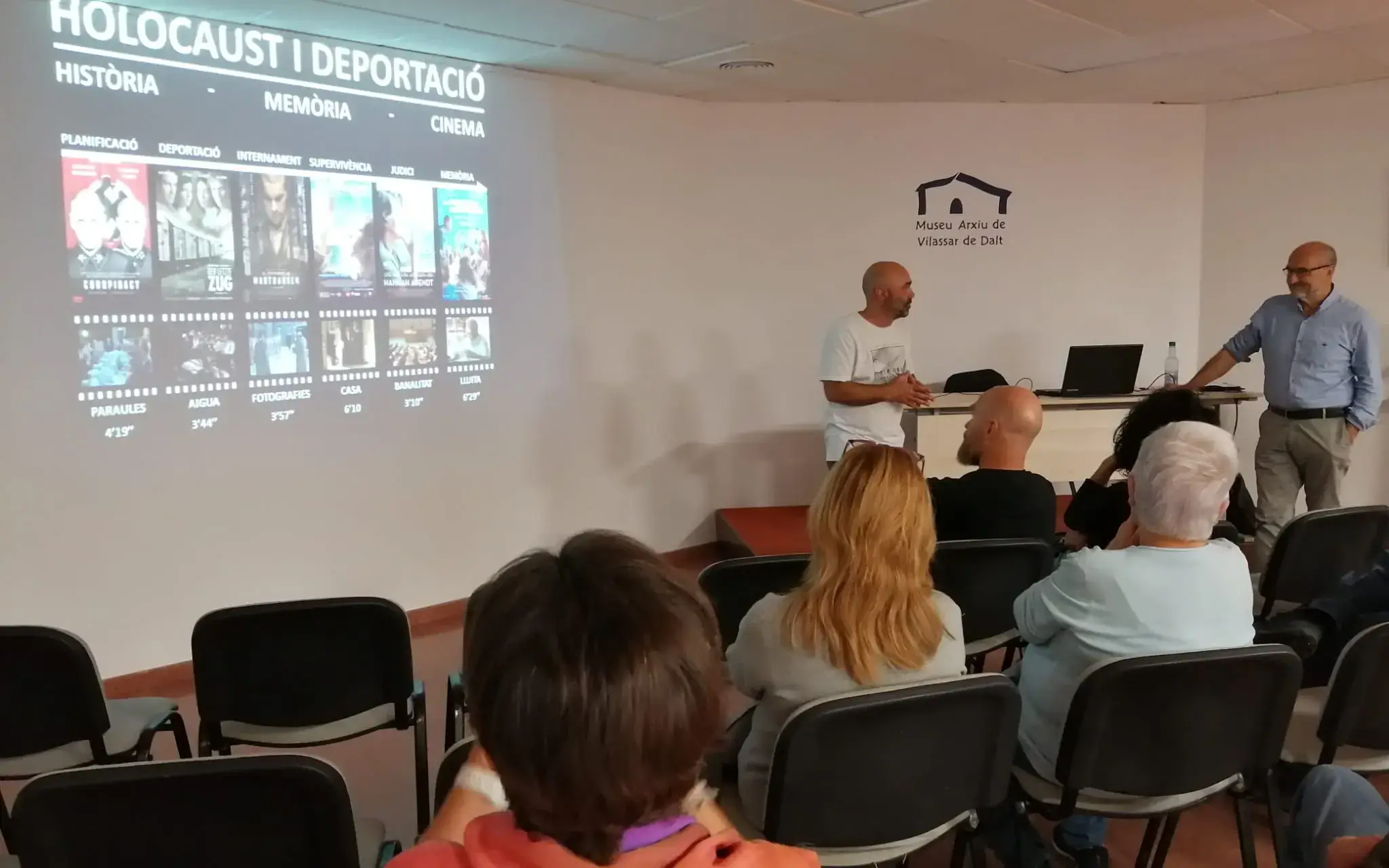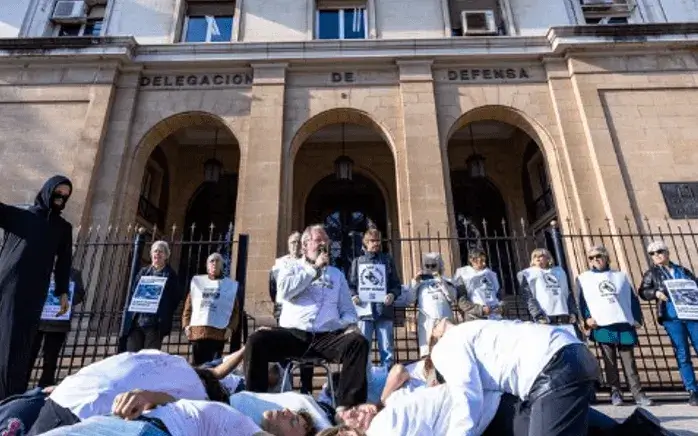The Xarxa Mai Més, promoted by the Amical de Mauthausen and other camps, focuses on municipalism, educational centers, and organizations to recover and defend the memory of deportation and raise awareness against fascism.
The battle against fascism can only be won through education, memory, and strengthening the democratic values of the citizens. In a time of resurgent far-right movements everywhere, there is no better antidote to fascism than knowing history, especially for the youth. With this mission, the Xarxa Mai Més was born in 2013, a project promoted by the Amical de Mauthausen and other camps aimed at recovering and defending the memory of deportation and republican values, while also raising awareness and educating against fascism and in favor of human rights.
In Catalonia, the issue of memory in the classrooms has made significant progress in recent years, especially since the approval of the laws on democratic memory. However, there was a time when knowledge of recent - and darker - history in the educational institutions of the country was lacking initiative from the teachers.
"Starting with the law and the creation of the Democratic Memorial in 2007, institutional policies in this regard were developed, and good work was done, which has also been extended to educational institutions. But before that, it mainly depended on the empathy, responsibility, and sensitivity of the teachers who, on their own initiative, wanted to introduce this topic into their educational programs," explains Juan Manuel Calvo, the current president of the Amical de Mauthausen.
This has changed a lot, and, for example, this year's Catalonia democratic memory law includes, among other measures, the study of memory in educational curricula and offers pedagogical tools and training to teachers. "In this generational change, where many people have not experienced the Civil War or Franco's regime, it is essential to introduce democratic memory into the educational curricula as a means to reinforce the guarantees of non-repetition," said the Justice Councillor, Gemma Ubasart.
However, the long absence of institutional policies in this area has caused "a general lack of knowledge about the issue due to this obvious gap," admits Calvo. This is where the Xarxa Mai Més comes into play, an initiative that aims to work hand in hand with local governments, educational institutions, associations, and organizations to promote the knowledge and dissemination of memory, as well as the prevention of fascism. This work is carried out, to a large extent, through the stories and biographies of deported individuals.
Memory and prevention of fascism at the local level
One of the best ways to do this is through the local level, which is why one of the main purposes of the network is to focus on municipalism, a privileged space for working on memory policies, and to link these actions to educational institutions. In fact, the project was created to respond to the demands in this regard from municipalities and schools with whom the Amical de Mauthausen had already established collaboration.
"The idea was to create a network coordinated by the Amical, where different municipalities in the country, also at the state level, could share educational projects and experiences for schools, institutes, and universities, as well as provide resources that we had or could develop from the organization, such as exhibitions, lectures, and visits to camps like Mauthausen," says Calvo.
From the very beginning, the network was conceived as a tool to facilitate collaboration, coordination, and the transmission of information between the Amical and other stakeholders, such as local authorities and educational institutions. The focus on the local level was seen as an opportunity to work on the recovery of personal and collective memory, especially considering the presence of deported individuals and their families in many Catalan municipalities.
Thanks to this collaboration with the local level, the project has organized annual meetings of participating municipalities or those related to the Xarxa Mai Més since 2015. These gatherings have created spaces for debate, reflection, and the exchange of experiences on public memory policies and the role of local governments in their development.
Furthermore, since the network's establishment, a wide range of activities has been planned with municipalities that have chosen to work on memory recovery, such as tributes to deported individuals, memory days, commemorations, and memory itineraries, among others.
Another goal of the network in relation to municipalism is the proximity and connection between local governments and educational institutions through the education departments of the municipalities. These departments can facilitate the integration of the Amical's proposals into the educational world, making collaboration more seamless.
Educating against fascism in the classrooms
Certainly, the educational aspect of the project to raise awareness and educate against fascism and in favor of human rights is another major pillar of the Xarxa Mai Més work. Education is always an intrinsic part of the solution when it comes to preventing totalitarianism. This is emphasized by the proponents of the initiative, which promotes a range of activities and proposals to make young people aware of the horrors of the Nazi atrocities and prevent them from happening again. In short, the goal is to turn memory into a commitment against fascism.
This work with educational institutions is done in multiple ways, always in close collaboration with teachers. "We make ourselves available to teachers, who have their educational programs, and we can complement them with specific activity proposals designed to enhance the curriculum," says the president of the Amical.
Among these proposals is the traditional lecture format, in which the Amical explains the process that deported individuals went through or the path they followed to reach the Nazi camps, for example. Generally, the activity is prepared and adjusted to the needs of each school.
"We adapt to the needs of each school; in the case that, for example, there is a greater emphasis on more global aspects such as the Holocaust, the lecture is tailored to this more global view of what the extermination meant, but always emphasizing the presence of Catalan and Spanish Republicans in exile," details Calvo.
In addition, the network also offers the possibility of sharing testimonies from direct family members of deported individuals. "At this point, there are no longer any Spanish survivors of the Nazi camps, but direct family members, such as children, can provide first-hand testimonial training," says Calvo, who points out that the concept of a victim goes beyond the person who suffered deportation and extends to their family environment, which has the capacity to advocate for the anti-fascist struggle and the defense of republican values.
Another activity that has been developed in schools in recent times is memory workshops. These are cinema workshops, taught by an expert, structured around film excerpts that allow students to learn about the different stages of the Holocaust and extermination. Following the screening of these passages from films on the topic, a space for dialogue and reflection is established in the classroom.
Furthermore, among the proposed activities, the network also offers young people the opportunity to receive guidance and orientation for their research on concentration camps and Republican deportation. Or to organize visits of schools to the headquarters of the Amical, so that students can take advantage of the organization's resources, such as documentation, archives, and the library, as well as learn about the work that is carried out.
Outside educational institutions, the Xarxa Mai Més has also been organizing meetings of high school students from institutes participating in the project since 2013, providing a privileged space for showcasing and exchanging projects, research, reflections, and artistic activities related to memory and deportation.
However, if there is one activity that stands out for its impact on young people and on anyone, it is undoubtedly the visits to Nazi concentration camps. "Visits to the camps are very important to us, and we have been doing them for more than twenty years; we go to Mauthausen around the fifth of May, a day when an international commemorative event is held to remember the camp's liberation," emphasizes Juan Manuel Calvo.
To network with organizations and offer resources as an antidote to the resurgence of the far-right
Beyond the educational perspective, the scope of the project also extends to organizations and associations that can join the network and share their knowledge and work with archives and documentation, a relevant means for the development of memory projects within the framework of the Xarxa Mai Més to protect and raise awareness against fascism.
On the other hand, the project's website also provides a comprehensive resource bank for the development of memory projects, including books, films, links to websites, plays, among others. It is a living document that is periodically updated.
Any project that helps prevent the fading of the memory of the darkest episodes of humanity and prevents totalitarianism is very necessary, especially in the current context marked by the resurgence of the far-right everywhere, including in Spain and Catalonia. Working on it from the grassroots, educational institutions, and the local level is essential to prevent the horror that thousands of people endured from happening again.
"Not too many years ago, we thought we had democratic systems and a series of social and collective rights that, despite all their shortcomings, were consolidated. Unfortunately, recently we have seen that this is not the case with the resurgence of certain ideologies across Europe that had not previously had the resonance and support they currently have. Therefore, prevention is essential to fight for a better world, free from fascism," emphasizes Calvo.









Add new comment